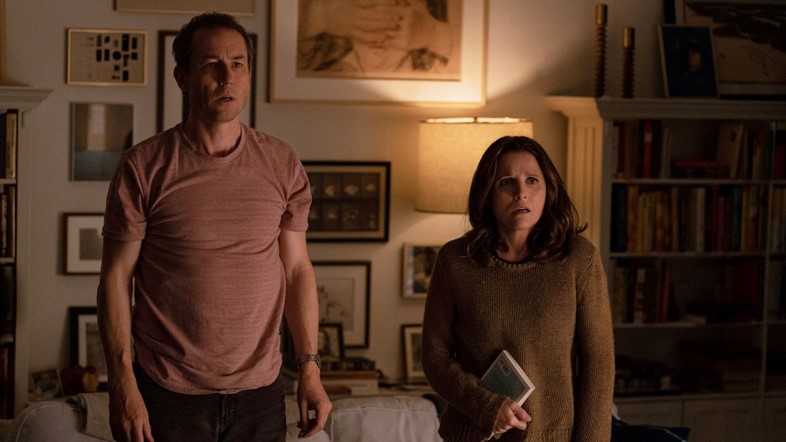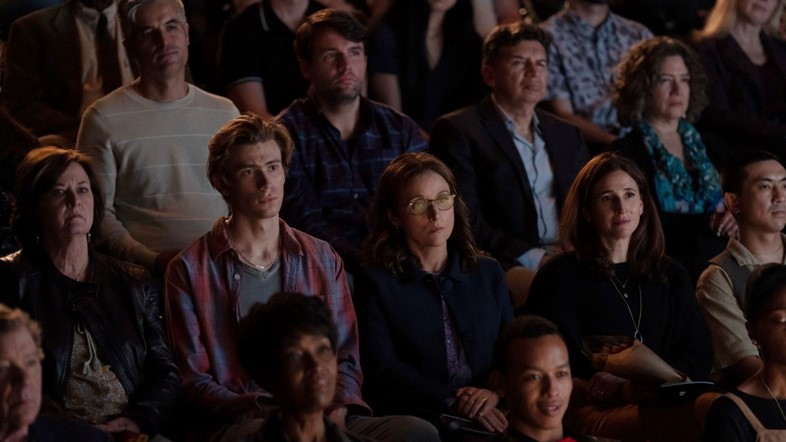As her new film is released, Nicole Holofcener talks about writing in the houses of Mike White and Ben Affleck, and why it’s “exhausting wanting people to like me”
In Nicole Holofcener’s 2013 romcom Enough Said, Julia Louis-Dreyfus wearily announces, “I’m tired of being funny.” Her bed partner, James Gandolfini, sighs, “Me too.” To which Louis-Dreyfus retorts, “But you’re not funny.” It’s a typical Holofcener exchange: honest, sad and inevitably leading to a joke. Truth is, in Holofcener’s movies, everyone is funny, whether they want to be or not. Often, it’s a defensive mechanism, a cry for help, or sometimes both – like, say, Amanda Peet deadpanning that she has no friends in Please Give. Elsewhere, it’s a secret language: the vicious humour uniting the family of Lovely & Amazing; the cruel nicknames throughout Walking and Talking; or, to pluck another example from Please Give, it’s Catherine Keener and Oliver Platt openly joking about wanting their elderly neighbour to die: to them, it’s hilarious because it’s true, and they can’t believe they’re admitting it out loud.
“I often don’t read the room,” Holofcener tells me in early June. “I’ll say something bluntly or abruptly, and people will get hurt or shocked. But I get this craving for everybody to just speak it like it is.” Now, the 63-year-old, LA-based writer-director has returned with a comedy-drama espousing on the taboo of telling the truth. In You Hurt My Feelings, one of the films of the year, a novelist, Beth (Louis-Dreyfus), almost passes out on the street upon overhearing her husband, Don (Tobias Menzies), reveal a deep, dark secret. Not an affair, it’s even worse: Don secretly dislikes Beth’s new book.
Sensitivity around artists is common. For instance, my interview with Holofcener begins with a two-minute ramble about my adoration of her filmography and my three failed attempts to interview her previously, all of which prove I’m an actual fan. After all, every journalist starts with a compliment. Does she ever suspect some are lying? “Of course I doubt it!” Holofcener exclaims. “That’s what I made the movie about, right? I try to believe people are telling the truth, but I think I can tell when they don’t.”
The previous day, a friend of hers saw the movie but only complimented the music, the topic choice, and how it was “really well shot”. “I was like: you’re hurting my feelings! It’s so obvious when someone plucks intellectual things to say but has no emotional response.” Mike White and Ben Affleck are thanked in the credits. Was that because they offered feedback? “No, they both allowed me to use their beautiful houses to write in.”
When I ask if it’s another type of rejection to write a script for a specific actor who says no, Holofcener insists it happens all the time. “I wrote Enough Said with Louis CK and Frances McDormand in mind. It didn’t happen for a variety of reasons. But thinking of talented people is inspiring, and imagining Julia [as Beth] saying these lines, made me a better writer.”
In a parallel storyline to Beth’s, Don is a disastrous therapist whose patients are keen to hurt his feelings. One couple demand a refund, another murmurs his displeasure before a Zoom call ends, not realising his audio is still on. “I have friends who are good therapists, not like Don,” Holofcener explains. “But it’s sobering to realise your therapist can be fucked up, and still be really helpful. Julia and I said we could make a whole movie that takes place in therapy. She wants to play a therapist. It’s just an endless sea of good scenes.”

As in Please Give, Louis-Dreyfus is a natural when it comes to Holofcener’s impeccable dialogue. After all, the auteur’s scripts are rich in observations we wish we could elucidate in our everyday lives. In Friends with Money, it’s casually interrogating close pals about their wages; in Walking and Talking, it’s informing your clingy BFF, “You’re gonna get sick of me one day, and you’re gonna have no friends left.” The lines are sharp, tightly constructed, and yet entirely natural – they inhabit that sweet spot between underwritten and overwritten. And, to paraphrase Please Give, they’re always funny.
Moreover, Holofcener’s characters feel fleshed out, even if few biographical details are revealed. Is it because she writes with confidence that oozes into the films via osmosis? “Yeah, it is,” she says. “Half the characters are me, and I know my backstory, even though they’re completely different than me.” One complication, not evident in the final film, was that Holofcener caught Covid, and for a period had to direct via FaceTime and her laptop. “It was kind of a mess but it worked out,” she says. Any benefits? “No positives. I know I missed very specific things that, had I been there, I would have changed.”
I tell Holofcener that one of my favourite cinema trips was a 35mm screening of Walking and Talking at the BFI just before the pandemic. While her debut was almost three decades ago, it’s still very much the same wry, comedic voice behind You Hurt My Feelings. “My writing hasn’t changed at all,” she says. “I mostly write in bed. I fall asleep a lot … I used to write a lot in coffee shops, but now I’m used to writing at home – or at major celebrities’ really nice houses.”
On the side, Holofcener directs TV shows (Gilmore Girls and Parks and Recreation are two credits), and has penned pilots that went nowhere. One was developed with Sharon Horgan, another was cancelled due to perceived similarities with Better Things, a show she adores. “Making a TV show is too much work for not enough payoff, so I’ve stopped trying. I don’t have it in me anymore.” Another missed chance was Holofcener dropping out of directing 50/50 in Canada, due to her son having trouble at school in LA. “I had to bail. It was very embarrassing and I felt terrible.”

Frequently, Holofcener is offered Hollywood punch-up gigs, usually to “make the female characters more edgy”. Recently, Ben Affleck and Matt Damon brought her on to rewrite The Last Duel, which earned her a co-writing credit. In terms of uncredited punch-up work, she names two examples as Ruby Gillman, Teenage Kraken (she frowns when I admit I’ve never heard of it) and Black Widow. “I had to watch a bunch of Marvel movies that I hadn’t seen before. I wrote the scene in the helicopter where they’re trying to gross out their dad, and talk about their uterus and what men often think of as disgusting female stuff.”
Holofcener is unsure what she’ll write next, but it’ll presumably be funny. Does the director ever get tired of being funny? “No, because that’s inherently how I write. When Beth and Don are on the street and he says, ‘I love you,’ and she says, ‘Oh, well, then, never mind’ – that’s a laugh, but it’s a really serious scene. It’s something I would probably say.” I clarify that I was asking about her as a person, not a screenwriter. “Yeah,” she sighs. “I want people to like me. It’s exhausting wanting people to like me.”
You Hurt My Feelings is streaming on Prime Video from August 8.
